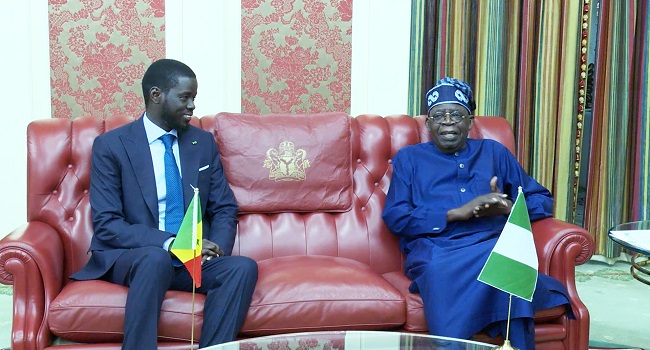In the gilded halls of the Abuja summit last June 21-22, where West Africa’s power brokers gathered to chart ECOWAS’s future, Nigeria’s President Bola Ahmed Tinubu quietly rewrote the script. What was expected to be a coronation for Senegal’s reformist president, Bassirou Diomaye Faye, turned into a calculated snub; a betrayal that may reshape ECOWAS’s balance of power and deepen fault lines between Anglophone and Francophone West Africa. Diplomatic sources in Abuja who briefed Huhuonline.com on the political drama that unfolded during the recently concluded ECOWAS summit, said Tinubu’s eleventh-hour pivot from Faye to Sierra Leone’s Julius Maada Bio, was a tactical move that blindsided Senegalese diplomats, alienated Francophone allies, and potentially ushered in a new era of diplomatic frost between Nigeria and Senegal.
Three diplomats with inside knowledge of the “coup” who elected anonymity, told Huhuonline.com that President Faye arrived in Abuja on June 21 with strong backing from much of the Francophone bloc, including Côte d’Ivoire and Togo. His youth, clean democratic credentials, and pan-African rhetoric had made him a favorite to lead ECOWAS into its post-coup recovery. By all early accounts, President Faye’s chairmanship was a formality and coronation. But behind closed doors, President Tinubu, described as West Africa’s political elder and ECOWAS’s largest financial contributor, was playing a different game. Insider accounts reveal that Tinubu initially signaled his support for Faye’s candidacy. But in a private side meeting with Ghanaian President Nana Akufo-Addo, the two agreed that ECOWAS could not afford to be seen as a Francophone-led club at a time of existential crisis. With Mali, Burkina Faso, and Niger having exited the bloc, and popular distrust mounting, Tinubu argued for “ideological neutrality and geographical balance,” noted one source
By late Saturday, during a closed-door session on June, Nigeria and Ghana reportedly shifted support behind the scenes toward Sierra Leone’s Bio. Sources told Huhuonline.com that President Tinubu had come to the conclusion that Bio’s reputation as a democratic reformer and negotiator during the Niger crisis) made him a more suitable candidate at this sensitive juncture. These covert conversations carried significant weight as both Nigeria and Ghana threatened to withhold their public endorsement unless ECOWAS members broadened the consensus; a subtle diplomatic rebuke to the French-speaking bloc’s bid.
In the summit’s decisive and dramatic vote, the West African leaders opted for Bio over Faye, not because Sierra Leone holds more formal weight, but because Bio’s selection offered a path toward restoring ECOWAS credibility, reinforcing constitutionalism, and repositioning the bloc amid external geopolitical pressures. The bloc prioritized perceived impartiality and diplomatic versatility. “Bio was seen as the figure who could navigate the Niger fallout and broker unity,” noted an ECOWAS insider, adding: “The decision underscored that political experience and diplomatic balance now trumped linguistic or regional affiliation.”
Tinubu’s move to throw Nigeria’s weight behind Julius Maada Bio – an Anglophone leader with moderate regional appeal and fewer political risks – was framed by one Aso Rock source as “pragmatic.” But for Senegalese officials, it was betrayal, plain and simple. “Faye was led to believe he had Nigeria’s endorsement,” said one regional diplomat. “Tinubu pulled the rug from under him.” Faye’s team was said to be stunned. Sources close to the delegation described their reaction as “frozen shock.” Senegal has yet to issue a formal protest, but the silence has been deafening. In Dakar, social media and local newspapers exploded with critiques of Nigeria’s duplicity, calling Tinubu’s maneuver “a slap in the face of regional trust.”
Diplomatic sources told Huhuonline.com that Tinubu’s betrayal has deeper implications for the organization: Francophone states, long wary of Nigeria’s dominance, now see this as a strategic marginalization. With Tinubu blocking Faye, some in the region worry that ECOWAS is becoming an Anglophone project in everything but name. For decades, the Francophone bloc – backed by France and often aligned through linguistic and institutional bonds – exerted considerable soft power within ECOWAS. But recent coups and France’s waning regional influence have destabilized that center of gravity. Tinubu’s move may be seen as a final push to reorder ECOWAS leadership away from French-speaking West Africa and toward Nigeria-centric realignment.
This risks alienating Francophone leaders already on edge over ECOWAS’s handling of the Sahel crisis, and undermining collective diplomacy, especially with Faye positioned as a potential regional consensus-builder. In the extreme, it could trigger future walkouts or quiet disengagement by countries like Senegal, Benin, and Côte d’Ivoire. A diplomatic source in Lomé summarized the mood: “Tinubu wanted an ECOWAS that reflects Nigeria’s priorities, not regional consensus. Francophone states are on notice.”
For Tinubu, this was more than just succession politics – it was strategic containment. Faye, a young Pan-Africanist with populist appeal, could have rapidly elevated Senegal’s influence across Francophone and Anglophone lines. Supporting Bio instead preserved the status quo and kept Nigeria at the center of ECOWAS’s decision-making core. But it’s a gamble. Tinubu now risks losing trust not only from Senegal but from an entire bloc of former allies. As Niger, Mali, and Burkina Faso drift toward the Russian sphere and anti-French resentment grows, alienating Francophone moderates like Faye could push ECOWAS further into irrelevance.
Conclusion: A Chair won; a Union Fractured
The chairmanship went to Julius Maada Bio, but the political cost may prove far steeper than anticipated. Tinubu’s betrayal of Faye has opened new fissures in ECOWAS that Bio will struggle to heal. Francophone leaders, sidelined and slighted, may retreat into national silos or alternative regional groupings. For ECOWAS, the Abuja summit was not just about leadership; it was a moment of reckoning. And for West Africa, it revealed a sobering truth: unity may be the first casualty of ambition.





